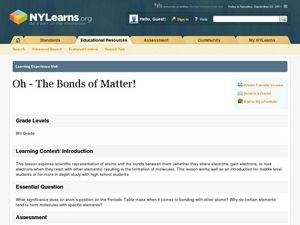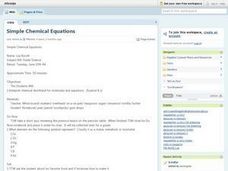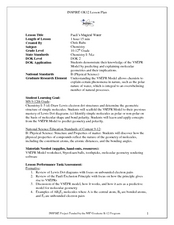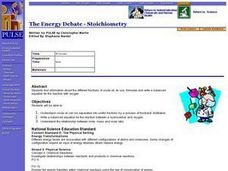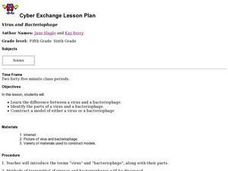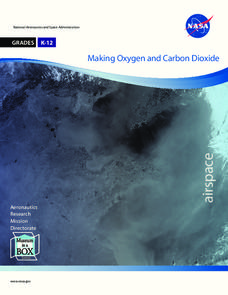Curated OER
The Mole
Students investigate moles and Avogadro's hypothesis. In this moles lesson plan, students complete a worksheet by finding the volume of 1 mole of each substance given its density and they find the number of molecules, the formula, the...
Curated OER
The Air Up There!
Students create a model of a column of air and discover one of the reasons why low and high pressure systems exist and why low pressure is often associated with bad weather.
Curated OER
Stellar Fingerprints: the Spectra of Stars
Students explain how an element can be identified using emission spectra. They relate the emission spectrum of hydrogen to its absorption spectrum and identify hydrogen absorption lines in the spectrum of stars.
Curated OER
Oh - The Bonds of Matter!
Eighth graders identify the types of bonds elements form. In this chemistry instructional activity, 8th graders represent valence electrons with dot structures. They draw and label different atoms.
Curated OER
Simple Chemical Equations
Eighth graders interpret the chemical symbols and shorthand used for molecules and equations. Through guided practice, 8th graders work to decipher and interpret the symbols for chemical equations. An opportunity for independent...
Curated OER
Basic Chemistry Review
Students experiment to show their knowledge of molecules and atomic structures. In this chemistry review lesson students participate in an activity and then fill out a worksheet.
Curated OER
Carbon: Structure Matters
Young scholars read the Who We Are Section on Calfee Designs Webpage and discuss carbon usage. They work in pairs to look up the minerals diamond and graphite then create a chart on the properties of each mineral then compare how they...
Curated OER
Molecular Architecture
Students cuminate their study of molecular structure and bonding with this activity.
Curated OER
Pauli's Magical Water
Students predict the shape of molecules using VSEPR theory. In this chemistry lesson, students differentiate a polar and nonpolar molecule. They discuss why water's polarity is very important.
Curated OER
Chemical Formulas Unit-Day 4
The purpose of this lesson involves reviewing nomenclature and molecular
formulas as well as introducing naming molecular compounds and identifying acids. The students investigate and understand how conservation of energy
and matter is...
Curated OER
Gases and Plasmas
Young scholars determine what plasma is and why the sun is made up of plasma. They recognize situations where plasmas are found in nature and made by man. They discuss why the sun is a huge ball of plasma and if there are different...
Chicago Botanic Garden
Carbon, Greenhouse Gases, and Climate
Climate models mathematically represent the interactions of the atmosphere, oceans, land, sun, surface, and ice. Part two in the series of four lessons looks at the role greenhouse gases play in keeping Earth warm and has participants...
Curated OER
Dilution and Concentration of Solutions
Future chemists practice laboratory techniques by creating a monochloramine solution. The objectives are to use of dilution, 9concentration, and measurement skills and to prepare a solution that will be used in a water treatment...
Curated OER
Polymers Lab: Bouncy Ball and Slime
Eighth graders investigate chemical reactions to produce polymers. In this polymers lesson plan, 8th graders experiment with sodium silicate and ethyl alcohol to make a polymer. They also experiment with borax and glue to make a polymer....
Curated OER
Of Electron Bondage
Students create models of ionic and covalent electronic bonds to demonstrate their understanding of these chemistry concepts. They explain how both ionic bonds and covalent bonds work so that younger students can understand.
Curated OER
The Energy Debate - Stoichiometry
Students determine crude oil can be separated into useful fractions by a process of fractional distillation. They write a balanced equation for the reaction between a hydrocarbon and oxygen.
Curated OER
Virus and Bacteriophage
Students examine the differences between a virus and a bacteriophage. They explore various websites, identify the parts of a virus and a bacteriophage, and construct a model of a virus or bacteriophage.
Curated OER
The Nature of Salt
High schoolers record information from the periodic table for sodium and chloride. They determine whether salts are molecular or ionic compounds, along with sodium chloride's molecular weight, and relative weights
Curated OER
WS 7.1 Kinetic-Molecular Theory of Gases/Pressure
In this kinetic molecular theory worksheet, students summarize the points of the kinetic molecular theory, they answer questions about pressure, and draw diagrams to show how suction cups, drinking straws and barometers work.
Cornell University
Bacteria Take Over and Down
Bacteria outnumber all other forms of life on Earth. Scholars observe the growth of bacteria in petri dishes to understand their role in maintaining good health. Then, they observe the growth of bacteria after they introduce...
Curated OER
Finding Oxidation States
In this chemistry worksheet, young scholars examine the oxidation state in order to apply it in the laboratory setting. The sheet includes in depth background information.
Curated OER
Oxidation Reduction Reactions
In this chemistry worksheet, students find the outcomes necessary for the oxidation reduction reactions. The sheet includes background information.
NASA
Making Oxygen and Carbon Dioxide
Some like it hot! Scholars observe both exothermic and endothermic reactions as part of the carbon dioxide oxygen cycle. First, scientists demonstrate (or watch) a chemical reaction to create pure oxygen using fire for...
Curated OER
The Connection Between Pigment and Light Colors
Students explain the mole concept and use this concept to prepare chemical solutions of particular molarities.
Other popular searches
- Atoms Molecules Elements
- Atoms Molecules and Element
- Elements Molecules and Atoms
- Atoms, Molecules, Elements



